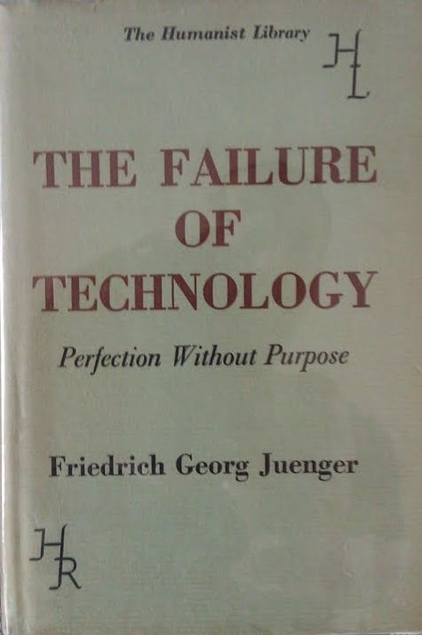Friedrich Georg Jünger: The Failure of Technology: Perfection Without Purpose (1946–)
Filed under book | Tags: · automation, critique of technology, environment, philosophy of technology, technology

Written in the spring and early summer of 1939 and “first published in German as Die Perfektion der Technik in 1946, F.G. Jünger argues that technology has become second nature and will bring “the downfall of the state”. F.G. Jünger, a literary writer and essayist, was the brother of Ernst Jünger. Both represented the intellectual right-wing of the ‘conservative revolution’ in the Weimar Republic and had ambivalent relations to the Third Reich.
The Failure of Technology was a major source for Heidegger’s 1950s turn towards a philosophy of technology in which technology, as second nature, determines human existence.” (FC)
Translated by F.D. Wieck
Introduction by Frederick D. Wilhelmsen
Publisher H. Regnery, Hinsdale, IL, 1949
New edition, 1956
xvi+189 pages
via FC
EPUB
PDF (Introduction missing)
Katerina Kolozova: Toward a Radical Metaphysics of Socialism: Marx and Laruelle (2015)
Filed under book | Tags: · alienation, automation, body, capitalism, cyborg, gender, marxism, metaphysics, philosophy, politics, socialism, technology

“Marx’s rigorously descriptive language unravels the radical core of capitalist economic processes and, through that unraveling, also reveals capitalism’s necessary exploitation and subjugation of human labor. Toward a Radical Metaphysics of Socialism attempts to recuperate and emancipate the notion of metaphysics in this scenario by virtue of radicalizing thought’s encounter with the Real. Kolozova argues that this metaphysical drama is at the origin of the social and economic injustices of contemporary global economic-political realities, and she illustrates this state of affairs in discussions of the problem of wage labor, automated speculation as the core of late capitalism, the post-2008 financial crisis, the status of technology in late capitalism, sexual difference and gender, and the human and non-human body’s subjugation capitalist automation.”
Publisher Punctum Books, Brooklyn/New York, August 2015
Creative Commons BY-NC-SA 4.0 License
ISBN 0692492410, 9780692492413
116 pages
Interview with author by Troy O’Neill
Publisher
Almanacco Letterario Bompiani: Elettronica e letteratura (1961) [Italian]
Filed under magazine | Tags: · automation, computing, digital humanities, humanities computing, language, linguistics, literary theory, literature, philology, robots

An early document from the field of humanities computing, today widely known as digital humanities.
Elettronica e letteratura is the title of the thematic section of an annual literary almanac published by Valentino Bompiani since 1925. The section contains the historical excursions by Rinaldo De Benedetti, Michele Pacifico and Franco Lucentini, and the reports on scientific research sponsored by Olivetti and IBM Italy and conducted by Roberto Busa, Stanislao Valsesia, Carlo Tagliavini, Silvio Ceccato, and Nanni Balestrini.
In one of the articles, the Jesuit priest Roberto Busa, often cited as the pioneer of the field, gives an account of his work on Index Thomisticus, a complete lemmatization of the works of Thomas Aquinas, started in the late 1940s (elsewhere: “During the World War II, between 1941 and 1946, I began to look for machines for the automation of the linguistic analysis of written texts. I found them, in 1949, at IBM in New York City.”).
Included is also a survey about the potential use of computers in literary scholarship (including a response from Pier Paolo Pasolini), entitled “Le due culture” [Two Cultures], and an essay by Umberto Eco.
in Almanacco Letterario Bompiani 1962: Le applicazioni dei calcolatori elettronici alle scienze morali e alla letteratura
Edited by Sergio Morando
Publisher Bompiani, Milan, December 1961
pages 87-188 (of 324)
via P–DPA log
Commentary (Adriano Comai, 1985, in Italian)
PDF (62 MB; large portion of the survey missing, 313ff)
See also an online emulator of Tape Mark 1 and Monoskop page on digital humanities.
Comments (2)
